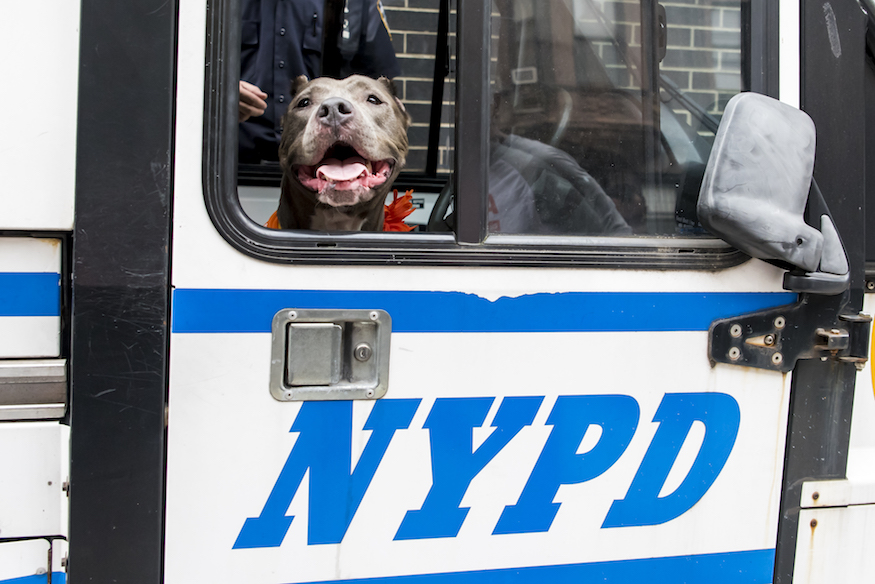In late December, NYPD Officer Michael Pascale was on patrol in Brooklyn when he heard a dog whimpering. It was tethered to a fence out in the cold and rain, a heavy chain around its neck, and Pascale, seeing no owner around, took the dog into his patrol car and got it care at the ASPCA Animal Hospital on 92nd Street.
Police investigated, but no one was identified as having abandoned the dog, now known as Joe. As the ASPCA treated the pit bull mix, Pascale kept asking for updates on Joe’s condition. Just a few days ago, he adopted the dog — a happy ending that Howard Lawrence, vice president of ASPCA Humane Law Enforcement, says wouldn’t be possible without the citywide partnership between the ASPCA and NYPD.
“He knew that there were resources available,” Lawrence said of Pascale’s actions. “He knew about the ASPCA-NYPD partnership and reached out to our liaison through that hotline, like a perfect story to get Joey of harm’s way.”
January 2019 marks the fifth anniversary of the ASPCA and NYPD partnership, the first of its kind for the nonprofit dedicated to the prevention of animal cruelty across the country.

Officer Pascale and Joe. Photo provided by ASPCA
In those five years, the partnership has helped law enforcement hone in on animal cruelty cases and provide assistance for New Yorkers who sometimes struggle to care for their pets. Since 2014, the NYPD has made nearly 700 arrests and the ASPCA has treated more than 3,300 victims of alleged animal cruelty.
That’s probably four times what would have happened under the old model, Lawrence said, before the NYPD and ASPCA partnership.
Previously, the ASPCA did have a small team of law enforcement agents investigating animal crimes throughout the five boroughs. But it was only about 17 people, and that model hadn’t changed since the ASPCA started in 1866, though the city has evolved a lot since then.
“We started looking at how the ASPCA could do better for New York City’s animals,” he said, and tapping into the NYPD and its 35,000 officers as a resource was the answer.
Through the partnership, NYPD responds to 311 calls concerning animals and 911 calls of allegations of animal cruelty, and the ASPCA then does the work to support these cases.
“If you look at an animal victim as a victim of crime like any other victim, we should support that work,” said Lawrence. “[Police] would bring those animal victims our hospital and we would do intake, forensic work, take photos, get ready for potential criminal case. We have an ICU, daily medical staff, a team of forensic vets who work as dedicated entirely to supporting NYPD criminal cases.”
ASPCA and NYPD partnership fights animal abuse and helps pet owners in need
Animal cruelty can be a sign of other criminal issues, like domestic abuse. By adding investigations of animal crime into the NYPD patrol guide (which wasn’t the case before the partnership), the partnership has shined a light on this behavior, and even allowed officers to notice other criminal behavior.
The ASPCA has a 24 hour police-only hotline to help officers handle any situation they come across, but not all of these situations are criminal abuse. In some instances, cops may respond to an animal outside without water or shelter, but it may be because someone elderly or sick is struggling to care for their pet. In those situations, the NYPD can connect pet owners to the ASPCA, who can help them things get dog houses or find a new home for that animal.

“The fact that we’re citing today 600 animals a year getting to us from criminal cases, and another 300 or 400 helped through the community engagement program, that’s 1,000 animals a year being helped as a direct result of this partnership, of the NYPD understanding and referring criminal and non criminal cases to us,” said Lawrence.
For the next five years of this partnership, Lawrence hopes to see this expand even more.
“We want every person in police department to understand the connection between a pet and their family, the connection between potential interpersonal violence and animal cruelty,” he said. “So much of what the NYPD responds to is non crimes. Let’s try to help them with those cases that are noncriminal, and make this a part of everyday policing in the city. We’re well in our way to that.”






















